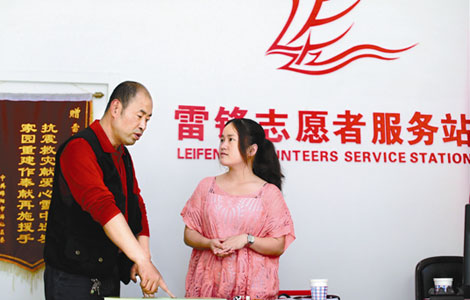China firm on transforming govt function: paper
Updated: 2013-05-14 16:16
(Xinhua)
|
|||||||||||
BEIJING - The Chinese government has resolutely vowed to transform its function and reform the administrative system to create a favorable environment for development, the People's Daily said Tuesday.
Such efforts have seen progress over the last two months, with the abolishment or delegation of 133 administrative approval items, the paper said in a commentary.
The decentralization of approval powers will inspire the market, society and local governments to be more creative and use their own power for economic and social development, the paper said.
It will also lower the benchmark for employment and improve the environment for creating businesses, it added.
The commentary said the transformation of government functions does not only mean canceling or delegating powers. It also requires innovating and improving administrative governance. The government should make concrete efforts to strengthen supervision, it said.
The government should also make innovations in offering public services and give further play to the role of society and the market. Complicated administrative management procedures should be optimized so that the government can focus on managing resources in key areas, according to the paper.
The commentary urged sound leadership and strict discipline to guarantee the reforms and ensure clear demarcation between the government, market and society.
Those who fail to effectively implement reforms should be held responsible, it said, adding that information regarding canceled or delegated items should be made public in a timely manner.
Premier Li Keqiang on Monday called for less political power in the market economy in order to inspire creativity among market players and transform the government.
During a national tele-conference regarding the functional transformation of the institutions of the State Council, or China's Cabinet, Li urged officials to properly handle relations between the government and the market, delegate unnecessary powers and manage businesses that the government is responsible for.
Related Stories
Economic issues to be priority of Li's 1-week trip 2013-05-14 02:02
Market to play bigger role, says Li 2013-05-14 01:56
Li calls for less political power in market economy 2013-05-13 23:44
China's economic growth offers opportunity: Li 2013-04-29 01:03
Today's Top News
Chinese Premier on first foreign trip
China visit first step to Greece's investment return
PBOC faces balancing act with rate, inflation
China to simplify foreign exchange rules on FDI
Market to play bigger role in economic innovation
Economic issues to be priority of Li's 1-week trip
Work with Red Cross to get boost
Taiwan protests against Philippines over shooting
Hot Topics
Lunar probe , China growth forecasts, Emission rules get tougher, China seen through 'colored lens', International board,
Editor's Picks

|

|

|

|

|

|





